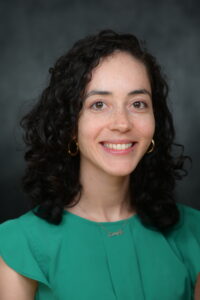Maria Muñoz is a Ph.D. student in the Department of Social, Behavioral, and Population Sciences at the Celia Scott Weatherhead School of Public Health at Tulane University. Her research examines food and nutrition insecurity and health disparities in communities on the frontlines of climate change. For her dissertation, she partners with community organizations in Louisiana to assess the resilience of emergency food systems and evaluate how disaster food assistance programs can better promote nutrition security and equity. Trained as a landscape architect, Maria has contributed to interdisciplinary projects addressing disparities in food access, flooding, and green infrastructure. She holds a Master’s in Disaster Resilience and Leadership from Tulane University. Continue reading to learn more about her recent work!
How do you explain your current research/job to friends and family?
I study how communities prepare for and recover from disasters—especially when it comes to food. My research looks at how programs like D-SNAP (Disaster Supplemental Nutrition Assistance Program) and local food networks (such as food banks, community pantries, farmers markets, and mutual aid groups) help families access healthy food after hurricanes and other emergencies. I approach this work through a design and systems-thinking lens, exploring how the structure and coordination of food assistance systems can be improved to promote equity, resilience, and nutrition security. In short, I try to understand how we can design disaster food systems that are more equitable, coordinated, and resilient.
What is a project you’re working on right now that you’re excited about?
Right now, I’m working on my dissertation, which explores how disaster food assistance systems can better promote nutrition security and equity in Louisiana communities affected by hurricanes. My research examines how organizations—such as food banks, churches, grassroots coalitions, and city agencies—coordinate to deliver food assistance during and after disasters. Using surveys, social network analysis, and interviews, I map these relationships to understand where systems are strong and where they struggle. I’m especially excited about the collaborative nature of this work, which brings together community partners, design tools, and systems-thinking approaches to reimagine what more resilient and equitable food systems could look like in disaster-prone regions.
What is a paper you recently published? What excited you about the question you answered?
I recently published “Food Security Dimensions in U.S. Disaster Plans: A Comparative Analysis of States and Territories.” This paper examines how different states and territories across the U.S. incorporate food security into their disaster plans, from emergency feeding logistics to nutrition standards and coordination with federal programs. I was excited by this question because it connects two fields that are often treated separately — disaster management and public health nutrition — and highlights the policy gaps that leave vulnerable communities at risk when disasters strike.
Muñoz MM, Gartner DJ, Hassan S, Fuster M. Food Security Dimensions in US Disaster Plans: A Comparative Analysis of States and Territories. Disaster Medicine and Public Health Preparedness. 2025;19:e107. doi:10.1017/dmp.2025.98
How do you envision your research impacting public health policies or practices? (What recommendations do you have for others hoping to translate their research into policy or practice?)
My goal is to help policymakers and emergency planners better integrate nutrition security into disaster preparedness and response. This means moving beyond short-term food relief toward systems that promote equitable access to healthy, culturally appropriate foods before, during, and after disasters. For others hoping to translate their research into policy or practice, I recommend collaborating early and often with practitioners (e.g., emergency planners, food banks, and community organizations) so that research questions and findings are grounded in real-world needs.
Interested in connecting? Click here for Maria’s LinkedIn.


